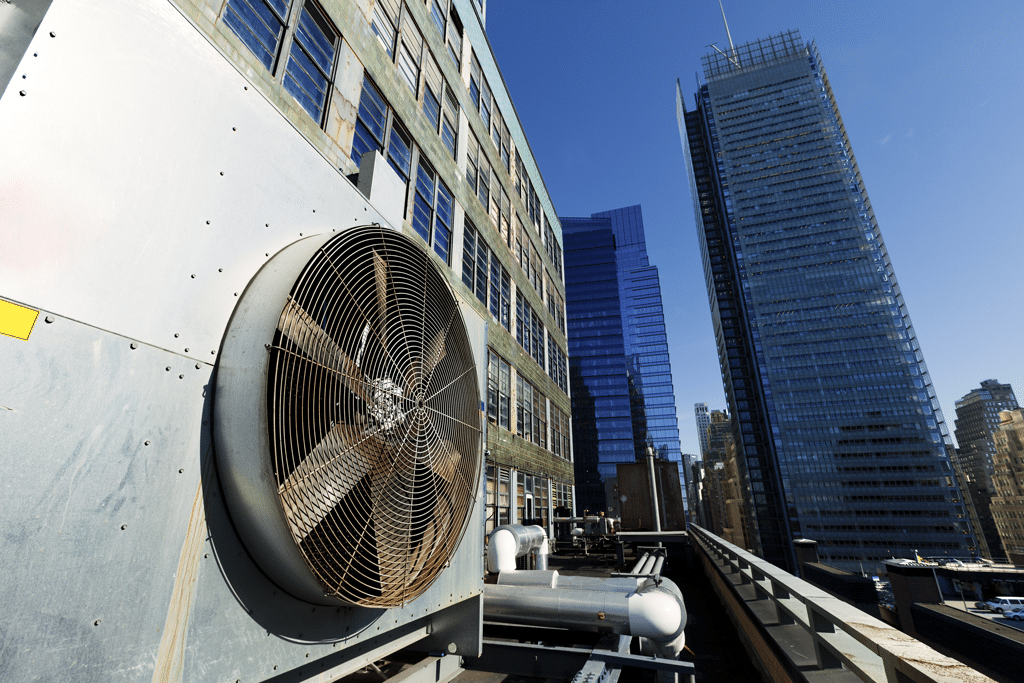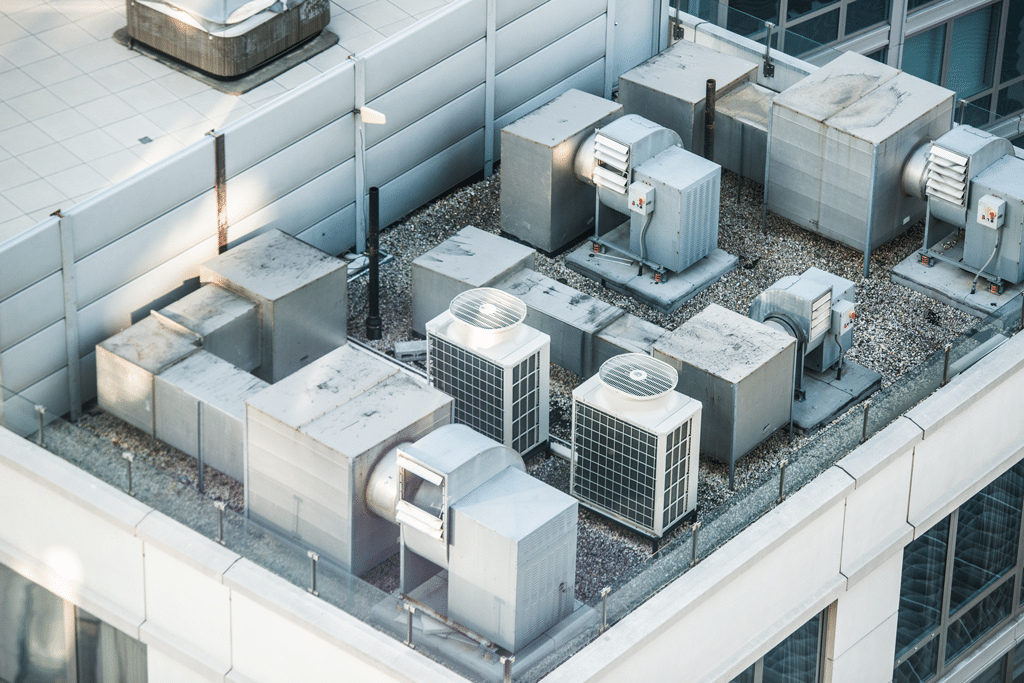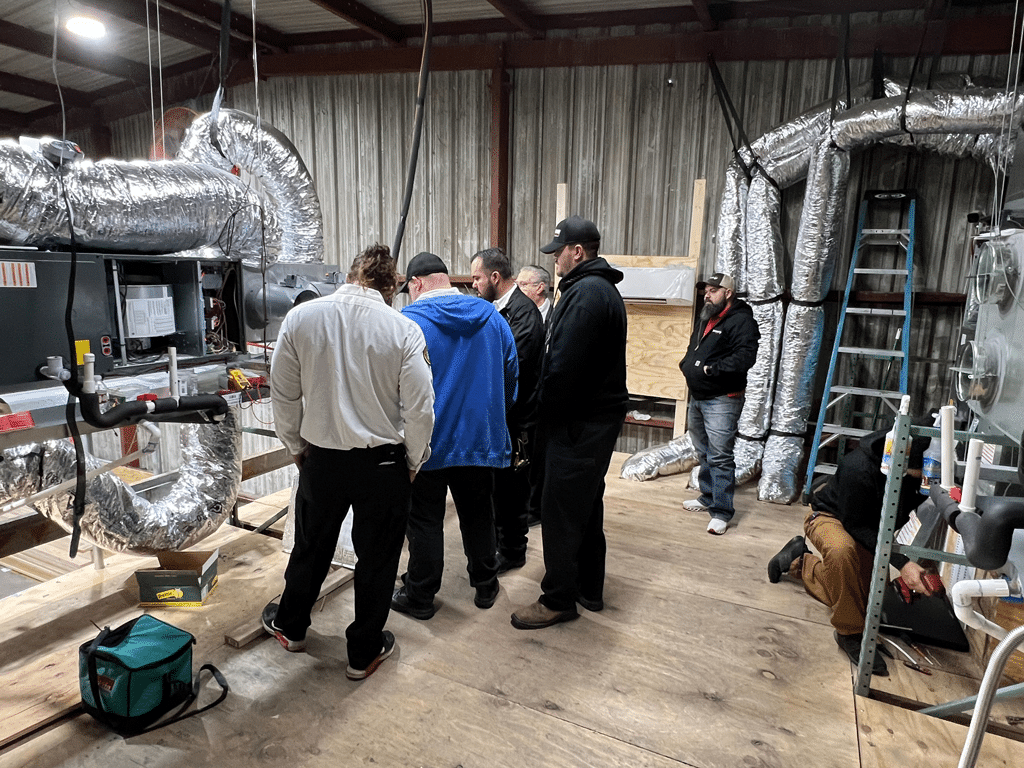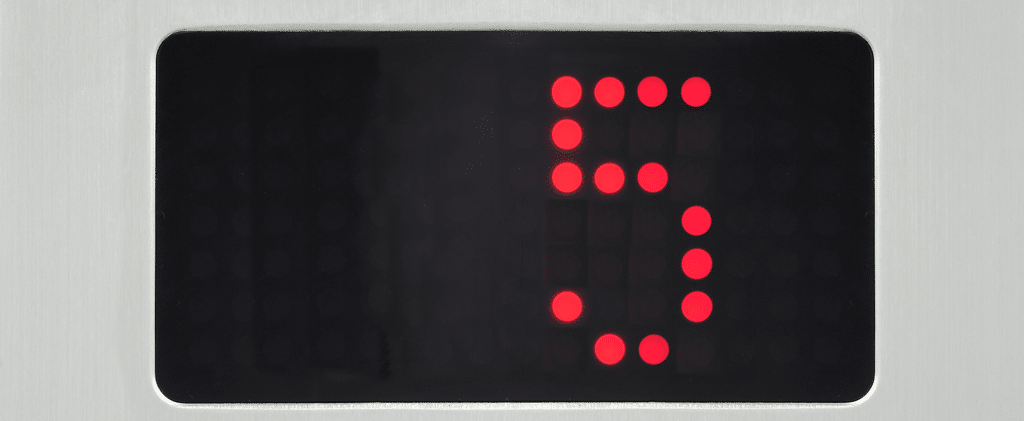
Revolutionizing Comfort: HVAC Commercial vs Residential Systems
Have you ever wondered about the differences between HVAC Commercial vs Residential systems?
As a homeowner or business owner, understanding these distinctions is crucial for optimal comfort and efficiency.
In this article, we’ll delve deep into the world of HVAC, focusing on the differences between commercial and residential systems.
You’ll learn about their unique features, maintenance requirements, and how to choose the right system for your needs. Whether you’re installing a new system or upgrading an existing one, this guide will provide valuable insights to make an informed decision.

What is HVAC Commercial vs Residential?
Understanding the distinction between HVAC commercial vs residential systems is crucial for anyone involved in property management, whether it’s for a large commercial complex or a cozy residential home.
The primary differences lie in scale, complexity, and customization, each tailored to meet specific needs.
Commercial HVAC systems are engineered for larger spaces like offices, shopping malls, and industrial buildings. These environments demand systems that can handle extensive square footage and unique architectural designs.
Consequently, commercial HVAC units are more robust, powerful, and complex. They often require intricate ductwork, multiple zones for temperature control, and advanced filtration systems to ensure a consistent and comfortable environment for a large number of occupants.
The complexity of these systems also means they require specialized installation and maintenance, often involving a team of professionals.
In contrast, HVAC Commercial vs Residential systems are designed with the home environment in mind. These systems prioritize comfort and energy efficiency, suitable for living spaces that require a more consistent and controlled climate.
Residential HVAC systems are typically smaller, less complex, and easier to operate.
They are designed to be user-friendly, with simple controls and straightforward maintenance routines. These systems also tend to be quieter, an important consideration for the home environment.
Another key aspect is the customization of HVAC systems.
Commercial units often require a bespoke approach to accommodate the diverse needs of different commercial spaces. This might include varying the system’s capacity, integrating it with other building management systems, or customizing the layout of ductwork.
Residential systems, while less customizable, offer a range of options to suit different home sizes and layouts, with features like programmable thermostats and multi-stage filtration systems.
Energy efficiency is a critical factor in both HVAC Commercial vs Residential systems. Commercial units, due to their size and the volume of space they need to condition, have a significant impact on energy consumption.
As such, they are often designed with energy-saving features like variable speed fans and smart thermostats.
Residential units also offer energy-efficient options, but the focus is more on reducing household energy bills and maintaining a comfortable living environment.
When considering HVAC commercial vs residential systems, it’s important to recognize the specific requirements of each. Commercial systems need to cater to larger, more complex spaces with a focus on customization and energy efficiency at scale.
Residential systems, meanwhile, are designed for comfort and efficiency in a home setting, with ease of use and maintenance as key considerations.
Understanding these differences ensures that whether you’re a homeowner or a commercial property manager, you can make informed decisions about your HVAC needs.

Scale and Size in HVAC Commercial vs Residential
The Magnitude of Commercial HVAC Systems
When it comes to HVAC commercial vs residential, one of the most striking differences is in their scale and size.
Commercial HVAC systems are engineered to handle the demands of larger spaces such as office buildings, shopping centers, and industrial facilities.
These systems are not just bigger in physical size, but they also possess a greater capacity to heat, cool, and ventilate expansive areas efficiently.
In commercial settings, the HVAC system must adapt to a variety of internal and external factors.
For instance, a large office building may have multiple floors with different heating and cooling needs.
The system must be powerful enough to provide consistent temperature control across all areas, despite the varying levels of occupancy and activity.
This often requires complex ductwork, multiple heating and cooling zones, and advanced control systems to manage the distribution of air effectively.
Customization in Commercial HVAC
Another aspect where the scale plays a crucial role is in the customization of commercial HVAC systems.
Unlike residential systems, which are more standardized, commercial HVAC units often require a tailored approach. This customization is essential to address the unique architectural designs and usage patterns of commercial buildings.
For example, a shopping mall with large open spaces and high ceilings will have different HVAC requirements compared to a densely packed, multi-story office building.
Residential HVAC: Compact and Efficient
In contrast, residential HVAC systems are designed for smaller, more contained spaces like homes and apartments.
These systems are typically less powerful than their commercial counterparts but are more than adequate for the square footage they need to cover.
Residential units focus on delivering comfort in a compact and efficient manner. They are engineered to fit within the limited space of a home, often integrating seamlessly with the living environment.
Residential HVAC systems also tend to have a simpler design, making them easier to install and maintain.
The scale of these systems allows for a more straightforward approach to heating and cooling, with less need for the complex zoning and customization seen in HVAC Commercial vs Residential systems. This simplicity also extends to the user experience, with residential systems often featuring user-friendly controls and easy-to-understand maintenance procedures.
The scale and size of HVAC commercial vs residential systems play a pivotal role in their design and functionality.
Commercial systems are built for power and customization, catering to the diverse and extensive needs of commercial spaces.
Residential systems, on the other hand, prioritize compactness and efficiency, providing comfortable living environments without the complexity of commercial setups.
Understanding these differences is key to choosing the right HVAC solution for your space, whether it’s a vast commercial property or a cozy family home.
Complexity and Features in HVAC Commercial vs Residential
Advanced Features in Commercial HVAC Systems
The complexity of HVAC commercial vs residential systems becomes evident when we examine the advanced features typically found in commercial setups.
Commercial HVAC units are not just about heating and cooling large spaces; they are integrated systems designed to address a multitude of environmental and operational demands.
One of the key features of commercial HVAC systems is zoning.
Zoning allows different areas of a large building to have individual temperature control. This is particularly important in commercial settings where different rooms or sections may have varying heating and cooling needs.
For instance, a sunny conference room with large windows may require more cooling than an interior storage room.
Zoning helps in efficiently managing these diverse requirements, enhancing comfort while optimizing energy use.
Energy management is another critical aspect of commercial HVAC systems. Given the larger scale of these systems, energy consumption can be significant.
Modern commercial HVAC units are equipped with sophisticated energy management systems that help in monitoring and controlling energy use. This not only reduces operational costs but also aligns with the growing emphasis on sustainability and eco-friendliness in commercial building management.
Air quality control is an additional feature that underscores the complexity of commercial HVAC systems. Maintaining good indoor air quality is crucial in commercial environments, especially in spaces like hospitals, schools, and office buildings where air quality can directly impact health and productivity.
Commercial HVAC systems often include advanced filtration systems, humidity control, and ventilation mechanisms to ensure that the air remains clean and healthy.
Simplicity and Efficiency in Residential HVAC
In contrast, residential HVAC systems are typically more straightforward.
The primary focus of these systems is to provide a comfortable living environment in a home setting. While they may not boast the advanced features of commercial systems, residential HVAC units are designed for efficiency and ease of use.
Residential systems may include basic zoning capabilities, particularly in larger homes, but these are generally less complex than commercial zoning systems.
Energy efficiency is also a key feature in residential HVAC, with many systems offering programmable thermostats and energy-saving modes to help homeowners manage their energy consumption effectively.
The simplicity of HVAC Commercial vs Residential systems extends to their maintenance and operation. Homeowners can often perform basic maintenance tasks like filter changes themselves, and the systems are usually designed with user-friendly interfaces for easy control and monitoring.
The complexity and features of HVAC commercial vs residential systems vary significantly. Commercial HVAC units are complex, incorporating advanced features like zoning, energy management, and air quality control to cater to diverse commercial needs.
Residential systems, while simpler, focus on efficiency and ease of use, providing comfortable and manageable living environments.
Understanding these differences is crucial for anyone looking to install or upgrade their HVAC system, ensuring they choose the right features and capabilities for their specific needs.

Installation and Maintenance in HVAC Commercial vs Residential
Installation Challenges in Commercial HVAC Systems
The installation process of HVAC commercial vs residential systems highlights significant differences, particularly in terms of complexity and customization.
Commercial HVAC installations are often large-scale projects that require meticulous planning and specialized expertise.
One of the primary challenges in installing commercial HVAC systems is the need for customization. Each commercial building has its unique architectural design, space utilization, and occupancy patterns, all of which influence the HVAC system’s design.
For instance, a multi-story office building may require a different HVAC setup compared to a sprawling shopping mall. This necessitates a tailored approach, often involving custom ductwork, specialized ventilation systems, and unique heating and cooling zones.
Additionally, commercial HVAC installations must consider factors like energy efficiency, air quality, and system integration. These systems often need to be integrated with other building management systems, requiring coordination between various contractors and specialists.
This level of complexity demands a high degree of technical expertise and experience, making the installation process more involved than residential systems.
Maintenance Demands of Commercial HVAC
When it comes to HVAC Commercial vs Residential systems maintenance, commercial HVAC systems require a more intensive approach due to their complexity and the higher demand placed on them.
Regular maintenance is crucial to ensure these large systems operate efficiently and reliably. This involves routine checks of all components, including compressors, coils, ducts, and filters, as well as system calibration and performance testing.
The maintenance of commercial HVAC systems is also more frequent due to the continuous operation and heavier workload.
These HVAC Commercial vs Residential systems are designed to handle large volumes of air and maintain consistent temperatures in vast spaces, which can lead to quicker wear and tear. Regular professional maintenance helps in identifying potential issues early, preventing costly repairs and downtime.
Residential HVAC: Easier Installation and Maintenance
In contrast, residential HVAC systems are generally simpler to install and maintain. These systems are designed for standard-sized homes, reducing the need for extensive customization.
The installation process is typically straightforward, often completed in a single day, and does not require the same level of technical coordination as commercial systems.
Maintenance for HVAC Commercial vs Residential systems is also less demanding. Homeowners can perform some basic maintenance tasks, such as replacing filters or cleaning vents. Professional maintenance is still recommended, but it is usually less frequent and less complex compared to commercial systems.
The installation and maintenance of HVAC commercial vs residential systems differ significantly. Commercial HVAC requires careful planning, customization, and frequent professional maintenance due to its complexity and heavy usage.
Residential HVAC, on the other hand, offers simpler installation and maintenance, making it more manageable for homeowners.
Understanding these differences is essential for proper system selection and ensuring long-term efficiency and reliability.
Cost Implications in HVAC Commercial vs Residential
Initial Investment in Commercial HVAC Systems
When considering the cost implications of HVAC commercial vs residential systems, the initial investment is a significant factor.
Commercial HVAC systems generally come with a higher price tag compared to residential systems. This difference in cost is attributed to several factors inherent in the nature of commercial systems.
Firstly, the scale and complexity of commercial HVAC systems contribute to their higher cost. These systems are designed to cover larger areas, often with customized solutions to fit specific building requirements.
The need for specialized components, such as larger ductwork, industrial-grade cooling units, and advanced control systems, adds to the overall expense.
Additionally, the installation process for commercial HVAC systems is more intricate, requiring skilled technicians and potentially complex retrofitting in existing buildings, further increasing the initial investment.
Ongoing Maintenance and Energy Costs
Beyond the initial purchase and installation, the cost of maintaining HVAC Commercial vs Residential systems is also higher.
These systems are subjected to more intensive use and, therefore, require more frequent and comprehensive maintenance to ensure optimal performance and longevity.
Regular professional servicing, repairs, and part replacements contribute to the ongoing maintenance costs.
Energy consumption is another critical factor in the cost analysis of HVAC commercial vs residential systems.
Commercial HVAC units are designed to heat, cool, and ventilate large spaces, which naturally leads to higher energy usage.
While modern commercial systems are increasingly energy-efficient, the sheer scale of their operation means that energy costs can be substantial, especially in buildings with extended operating hours or those that require stringent climate control, such as hospitals or data centers.
Residential HVAC: More Affordable and Energy-Efficient
In contrast, residential HVAC systems are generally more affordable in terms of both initial investment and ongoing costs.
The smaller scale of residential units means they require less material and labor for installation.
Additionally, the simplicity of these systems often allows for easier and less frequent maintenance, reducing long-term costs.
Residential HVAC systems also tend to be more energy-efficient on a smaller scale. Advances in technology have led to the development of residential HVAC units that offer significant energy savings, which is beneficial given the rising energy costs and growing environmental concerns.
Programmable thermostats, energy-efficient compressors, and improved insulation in residential units contribute to lower energy consumption, making them more cost-effective over time.
The cost implications of HVAC commercial vs residential systems are markedly different. Commercial systems demand higher initial investment, more intensive maintenance, and incur greater energy costs due to their scale and complexity. Residential systems, while simpler, offer a more cost-effective solution with lower initial costs, easier maintenance, and better energy efficiency for smaller spaces.
Understanding these cost differences is crucial for budgeting and long-term financial planning, whether for a commercial property or a residential home.

Energy Efficiency in HVAC Commercial vs Residential
Advanced Energy-Saving in Commercial HVAC
When exploring energy efficiency in the context of HVAC commercial vs residential systems, it’s evident that both sectors have made significant strides, albeit in different ways.
Commercial HVAC systems, due to their larger scale of operation, often incorporate more advanced energy-saving features. These features are designed not only to reduce operational costs but also to align with environmental sustainability goals.
One of the key aspects of energy efficiency in commercial HVAC systems is the use of sophisticated control systems. These systems allow for precise regulation of temperature and airflow, ensuring that energy is not wasted in unoccupied areas of a building.
For instance, modern HVAC Commercial vs Residential systems can be integrated with occupancy sensors or time-scheduled controls to reduce heating or cooling in certain zones when they are not in use.
Another feature common in commercial HVAC systems is the use of high-efficiency filters and ventilation systems. These components ensure that the air quality is maintained without excessive energy consumption.
Additionally, many commercial HVAC units are now equipped with variable speed drives.
These drives adjust the speed of fans and compressors based on real-time demand, which significantly reduces energy usage compared to traditional fixed-speed systems.
Residential HVAC: Focused on Cost-Effective Efficiency
In residential settings, while the energy-efficient options may not be as advanced as in commercial systems, they are increasingly becoming more sophisticated.
Residential HVAC systems are typically designed with a focus on cost-effective efficiency, suitable for smaller-scale operations.
One of the most common energy-saving features in residential HVAC systems is the programmable thermostat. These thermostats allow homeowners to set heating and cooling schedules, reducing energy usage when the home is unoccupied.
Additionally, many modern residential HVAC units come with higher Seasonal Energy Efficiency Ratios (SEER), indicating better energy efficiency.
Residential systems also benefit from advancements in compressor technology.
For example, newer residential HVAC units often feature scroll or variable-speed compressors that adjust cooling and heating output to match the specific needs of the home, thereby reducing energy waste.
Bridging the Gap Between Commercial and Residential Efficiency
The trend in both HVAC commercial vs residential sectors is moving towards more energy-efficient systems.
While commercial units lead in advanced features due to their scale, residential systems are quickly catching up, incorporating technologies that were once exclusive to commercial applications.
This convergence is driven by a growing awareness of energy costs and environmental impact, making energy efficiency a top priority in HVAC system design and selection.
Energy efficiency in HVAC commercial vs residential systems is a key area of focus, with both types offering energy-efficient options.
Commercial systems often feature more advanced energy-saving technologies due to their larger scale of operation. In contrast, residential systems focus on cost-effective efficiency, with features like programmable thermostats and high-efficiency compressors.
As HVAC commercial vs residential systems advances, the gap in energy efficiency between commercial and residential HVAC systems continues to narrow, reflecting the industry’s commitment to sustainable and cost-effective climate control solutions.
Here’s everything else you need to know about choosing and maintaining the right HVAC system for your specific needs.
HVAC Innovations for Commercial and Residential Spaces
In the ever-evolving world of HVAC commercial vs residential systems, innovations are continuously shaping the way we control and manage indoor climates.
Whether you’re considering HVAC commercial vs residential system solutions for commercial or residential spaces, staying informed about the latest advancements is crucial.
Let’s explore some cutting-edge innovations that can enhance both commercial and residential HVAC systems.
Smart Thermostats and IoT Integration
Smart thermostats have revolutionized temperature control in both commercial and residential settings. These HVAC commercial vs residential system devices connect to the Internet of Things (IoT) and offer features like remote monitoring and control through smartphone apps. For commercial spaces, this means facility managers can efficiently manage temperature settings across multiple zones or even different buildings from a single interface.
In residential settings, homeowners can enjoy the convenience of adjusting their HVAC system remotely, ensuring comfort upon arrival.
Variable Refrigerant Flow (VRF) Systems
Variable Refrigerant Flow (VRF) systems are becoming increasingly popular in both commercial and residential HVAC.
These systems allow for individual control of temperature in different areas of a building or home.
VRF systems use refrigerant to transfer heat, making them highly efficient and providing precise control.
In commercial settings, VRF is perfect for spaces with varying heating and cooling needs, such as hotels or office buildings. In residential applications, it offers enhanced comfort and zoning capabilities.
Geothermal Heating and Cooling
Geothermal HVAC systems are gaining traction for their energy efficiency and eco-friendliness. These systems utilize the stable temperature of the earth to heat and cool buildings.
In commercial properties, geothermal systems are excellent for reducing energy costs and carbon footprints, particularly in large, energy-intensive buildings.
For homeowners, geothermal systems provide year-round comfort with lower operating costs, making them a sustainable and cost-effective choice.
Air Purification Technologies
Clean and healthy indoor air is a priority for both commercial and residential spaces. Advanced air purification technologies, such as UV-C sterilization and HEPA filtration, are now integrated into HVAC systems.
In commercial settings, this ensures better indoor air quality, crucial for places like hospitals and schools. For residential spaces, these technologies address allergens and pollutants, promoting a healthier living environment.
Energy Recovery Ventilators (ERVs)
Energy Recovery Ventilators (ERVs) are becoming popular for their ability to improve indoor air quality while conserving energy.
In commercial applications, ERVs are used to exchange stale indoor air with fresh outdoor air while recovering the energy used for heating or cooling. In residential settings, ERVs maintain a constant flow of fresh air without sacrificing energy efficiency, contributing to better indoor comfort and health.
Staying informed about HVAC innovations is essential for both commercial and residential property owners.
Smart thermostats, VRF systems, geothermal HVAC, air purification technologies, and ERVs are just a few examples of advancements that can enhance comfort, energy efficiency, and indoor air quality.
Whether you’re managing a large commercial building or a cozy home, these innovations have the potential to transform your HVAC experience, making it more efficient, sustainable, and comfortable than ever before.
Consider incorporating these cutting-edge technologies into your HVAC system to stay ahead in the world of climate control.

Top 5 Maintenance Tips for HVAC Commercial vs Residential Systems
1. Optimize Energy Efficiency
Energy efficiency is a cornerstone in the management of both HVAC commercial vs residential systems.
For commercial systems, the focus is on managing larger spaces efficiently, while residential systems concentrate on household energy savings. High SEER (Seasonal Energy Efficiency Ratio) ratings are a key indicator of an efficient system.
In commercial settings, this might involve advanced systems with variable air volume controls, while in residential settings, a high SEER rating often correlates with lower energy bills.
Programmable thermostats and zoning capabilities are also crucial for both types of systems, allowing for more precise control over heating and cooling, thus reducing unnecessary energy use.
Resources like Energy Star are invaluable in guiding choices towards more efficient systems.
2. Regular Maintenance
The importance of regular maintenance cannot be overstated in ensuring the longevity and efficiency of both residential and commercial HVAC systems.
For commercial HVAC, given the system’s complexity and the scale of operation, professional check-ups might be required more frequently.
Organizations like ASHRAE provide comprehensive guidelines on maintenance schedules that are tailored to the specific needs of HVAC commercial vs residential systems.
In residential settings, while the maintenance might be less complex, it is equally important to ensure the system operates at peak efficiency.
3. Consider the Environment
The environmental impact of HVAC systems is increasingly a priority for both commercial and residential system owners.
Eco-friendly refrigerants and high-efficiency systems are becoming the norm. The EPA offers extensive resources and guidelines on environmentally friendly HVAC options, encouraging the adoption of systems that have a reduced impact on the environment.
This is particularly important in commercial HVAC systems, which have a larger carbon footprint due to their scale.
4. Smart Controls
The integration of smart controls in HVAC systems has revolutionized how we manage indoor climates. Smart thermostats and IoT (Internet of Things) integration offer unprecedented control and monitoring capabilities, leading to enhanced energy management and improved comfort levels.
Companies like Honeywell are at the forefront, offering a range of smart HVAC controls suitable for both commercial and residential applications.
These HVAC commercial vs residential systems allow for remote monitoring and adjustments, which is particularly beneficial for commercial properties that require constant environmental monitoring.
5. Customization for Specific Needs
Customization is key in ensuring that HVAC commercial vs residential systems meet the specific needs of a space, whether it’s a commercial building or a residential home.
Commercial buildings often have unique architectural features and usage patterns that require tailored HVAC solutions.
Carrier, among other companies, specializes in providing customized HVAC solutions that cater to the specific demands of commercial spaces.
In residential settings, customization might involve selecting systems that are suited to the size and layout of the home, ensuring efficient and effective heating and cooling.
Optimizing energy efficiency, regular maintenance, considering environmental impact, implementing smart controls, and customization are essential strategies for managing HVAC commercial vs residential systems.
These strategies not only ensure efficient and effective operation but also contribute to sustainability and cost savings over the long term.
One Hour Air Conditioning & Heating of Dallas and HVAC Commercial vs Residential
Your Trusted HVAC Partner
When it comes to navigating the complexities of HVAC commercial vs residential systems, having a trusted partner by your side is essential.
One Hour Air Conditioning & Heating of Dallas is your go-to provider for both commercial and residential HVAC solutions. With years of expertise in the field, they understand the unique demands and intricacies of each system type, ensuring that you receive the most suitable HVAC commercial vs residential systems solution for your space.
Expert Guidance
One Hour Air Conditioning & Heating of Dallas offers expert guidance to help you make informed decisions about your HVAC needs.
Whether you’re managing a large commercial property or looking to enhance the comfort of your residential home, their team of professionals is well-equipped to assist you.
They take into consideration factors such as scale, customization, energy efficiency, and budget, providing recommendations tailored to your specific requirements.
Reviews and Ratings
Your confidence in a service provider is often bolstered by the experiences of others. One Hour Air Conditioning & Heating of Dallas understands this, which is why they encourage you to check out their Google Business Profile.
There, you can find reviews and ratings from satisfied customers who have benefited from their HVAC expertise.
It’s a testament to their commitment to delivering quality solutions for both commercial and residential clients.
Serving Multiple Locations
One Hour Air Conditioning & Heating of Dallas extends its services to various locations, including Addison, TX, Allen, TX, Carrollton, TX, Dallas, TX, Frisco, TX, Irving, TX, Lewisville, TX, McKinney, TX, Plano, TX, Richardson, TX, and The Colony, TX.
Their wide geographic reach ensures that businesses and homeowners across these areas have access to reliable HVAC services.
Contact for Your HVAC Needs
For all your HVAC needs, whether it’s for a commercial or residential property, don’t hesitate to get in touch with One Hour Air Conditioning & Heating of Dallas. You can reach them at 469-598-0524.
Their team is ready to assist you with installation, maintenance, and any HVAC-related queries you may have.
One Hour Air Conditioning & Heating of Dallas serves as your trusted partner in navigating the world of HVAC commercial vs residential systems. Their expertise, combined with a commitment to quality and customer satisfaction, makes them the go-to choice for businesses and homeowners alike.
Conclusion
The comparison between HVAC commercial vs residential systems highlights the distinct features and considerations associated with each. These systems, while both essential for maintaining comfortable indoor environments, serve different purposes and come with unique challenges.
HVAC commercial vs residential systems impress with their scale, complexity, and customization, making them suitable for vast spaces such as office buildings, shopping malls, and industrial complexes.
However, their initial investment, maintenance demands, and energy consumption are higher, reflecting the substantial requirements of commercial environments.
On the other hand, residential HVAC systems prioritize simplicity, energy efficiency, and ease of use, catering to the comfort of homes and smaller spaces.
While they may lack the advanced features of commercial systems, they offer cost-effective solutions with lower initial costs and maintenance requirements.
Regardless of the setting, optimizing energy efficiency, regular maintenance, environmental consciousness, smart controls, and customization are key strategies to ensure the effective operation of HVAC systems. These principles contribute to long-term sustainability, cost savings, and the overall well-being of occupants.
One Hour Air Conditioning & Heating of Dallas stands as a trusted partner, capable of guiding individuals and businesses through the intricacies of HVAC solutions.
Their expertise, supported by reviews and ratings, is available across multiple locations, making them a reliable resource for HVAC needs.
Ultimately, the choice between HVAC commercial vs residential systems hinges on individual requirements, emphasizing the importance of informed decisions and professional guidance.
Whether it’s a sprawling commercial complex or a cozy family home, the goal remains the same: to create a comfortable and energy-efficient indoor environment for all occupants.
FAQs on HVAC Commercial vs Residential
- What are the main differences between HVAC commercial vs residential systems?
Commercial HVAC systems are generally larger, more complex, and have more advanced features compared to residential systems, which are designed for smaller spaces and prioritize comfort and energy efficiency.
- How often should commercial HVAC systems be serviced?
Commercial HVAC systems typically require more frequent servicing due to their complexity and the higher demand placed on them.
It’s recommended to follow the guidelines provided by manufacturers or professional HVAC service providers.
- Can residential HVAC systems be used for small commercial spaces?
In some cases, residential HVAC systems can be suitable for small commercial spaces. However, it’s important to consult with HVAC professionals to ensure the system can meet the specific needs of the space.
- Are there energy-efficient options for both commercial and residential HVAC systems?
Yes, there are energy-efficient options available for both types of systems. Look for systems with high SEER ratings and consider features like programmable thermostats and zoning capabilities.
- What should I consider when choosing an HVAC system for a large commercial space?
For large commercial spaces, consider factors like the size and layout of the space, the system’s energy efficiency, zoning capabilities, and the potential need for customization to meet specific requirements.
- How do smart controls benefit HVAC systems?
Smart controls can improve the efficiency and comfort of both commercial and residential HVAC systems.
They allow for better energy management, remote control, and can adapt to usage patterns for optimal performance.
- What is the importance of regular maintenance for HVAC systems?
Regular maintenance is crucial for the longevity, efficiency, and performance of HVAC systems. It helps prevent breakdowns, ensures optimal operation, and can extend the life of the system.
- Can HVAC commercial vs residential systems impact indoor air quality?
Yes, HVAC systems can significantly impact indoor air quality. Proper maintenance and features like air filters and purifiers can improve air quality, while neglected systems can contribute to poor air quality.
- What are the cost implications of commercial vs residential HVAC systems?
Commercial HVAC systems generally have higher initial and maintenance costs compared to residential systems. However, investing in energy-efficient options can lead to long-term savings.
- How do I know if my HVAC system needs an upgrade?
Signs that your HVAC system may need an upgrade include frequent repairs, uneven heating or cooling, increased energy bills, and if the system is over 10 years old.
Check out our previous blog, here.







